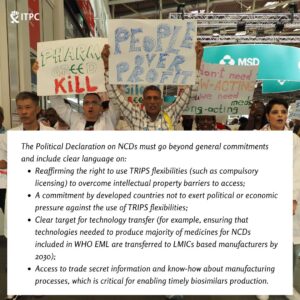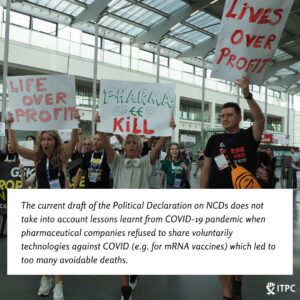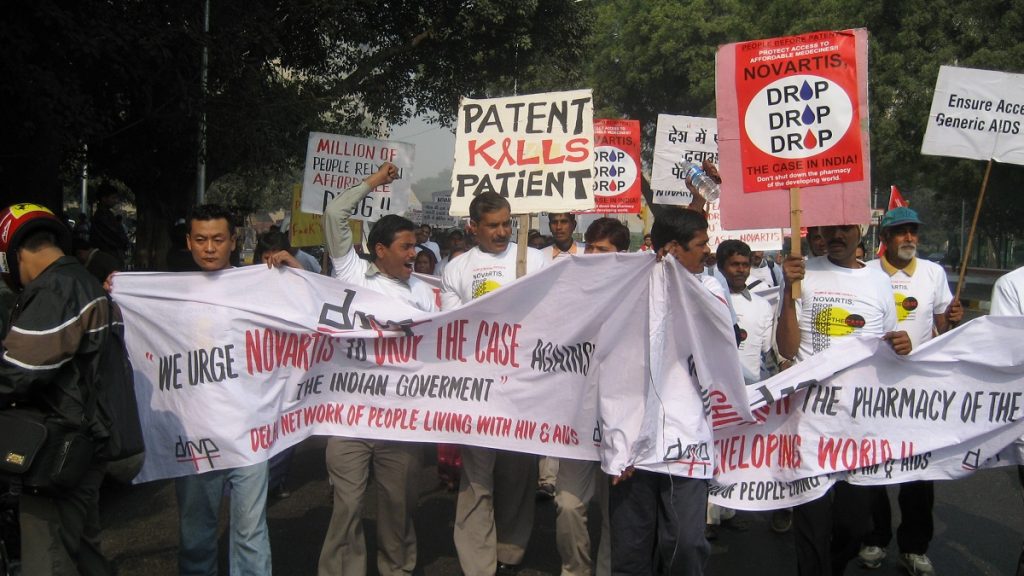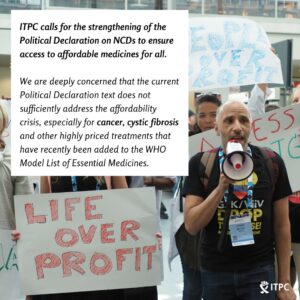The Make Medicines Affordable campaign, an initiative of ITPC Global, is urging governments to strengthen the upcoming UN Political Declaration on Noncommunicable Diseases (NCDs) to guarantee access to affordable medicines for all. The draft text, which will be adopted at the UN High-Level Meeting on September 25, falls short: it ignores the urgent affordability crisis for life-saving treatments and fails to address intellectual property barriers that keep prices out of reach.
Weaknesses in the Draft Declaration
Civil society groups warn that the latest draft does not reference the right of governments to use TRIPS flexibilities to ensure access to NCD medicines. Even if this right were reaffirmed, it would be insufficient, as governments in low- and middle-income countries (LMICs) often face political and economic pressure when attempting to use these tools.
Earlier versions of the declaration contained already weak language on intellectual property; in later drafts, this was deleted and replaced with a paragraph on voluntary measures and reaffirmation of Doha Declaration. But voluntary approaches — as the COVID-19 pandemic showed — failed to secure equitable vaccine access for LMICs. The same mistake must not be repeated with NCD medicines.
The Make Medicines Affordable campaign is therefore calling on Member States to ensure that the final declaration includes clear, binding provisions to:
- Reaffirm the right to use TRIPS flexibilities such as compulsory licensing to overcome IP barriers.
- Commit not to exert political or economic pressure against LMICs using these flexibilities.
- Set a target for technology transfer to local manufacturers in LMICs — for example, ensuring that by 2030, the technologies needed to produce the majority of essential NCD medicines are transferred to LMIC-based manufacturers.
- Outline measures for accessing trade secret information on manufacturing processes, which is critical for enabling timely production of biosimilars.
Without these provisions, the UN declaration will not live up to its theme of “equity and integration.” The global target of 80% availability of affordable NCD medicines in primary health care by 2030 will remain an empty promise.

WHO’s Essential Medicines List: A Warning Sign
The urgency of addressing affordability is underscored by the latest update to the WHO Model List of Essential Medicines (EML), released on September 5. For the first time, WHO added high-priced treatments for cancers, cystic fibrosis, diabetes, psoriasis, haemophilia, and other blood disorders to its list.
Traditionally, WHO only includes medicines considered affordable enough for widespread use in LMICs. But the inclusion of new cancer and cystic fibrosis drugs — priced at hundreds of thousands of dollars per patient per year — risks becoming an unfulfilled promise unless governments act to make them accessible.
Examples include:
- Pembrolizumab (cancer treatment), priced up to US $150,000 per year in the U.S. and Canada.
- Elexacaftor/tezacaftor/ivacaftor (cystic fibrosis treatment), priced at more than US $300,000 per year.
These exorbitant costs stem from pharmaceutical monopolies that exploit intellectual property rules to maximize profits, while depriving millions of people in LMICs of life-saving care. As cancer experts noted in WHO’s own discussions, such drugs are “likely not affordable and indeed acceptable to several countries and health systems, especially those in LMICs and LICs, due to high price, need for companion diagnostics and the risk of diverting resources at the expense of other essential medicines.”

From Declarations to Action
The inclusion of unaffordable drugs on WHO’s EML highlights the central contradiction: the world acknowledges which medicines are essential, yet governments fail to guarantee access to them. Unless the UN Political Declaration explicitly tackles affordability, intellectual property barriers, and technology transfer, the commitments made in New York will remain words on paper rather than real progress for people living with NCDs.


